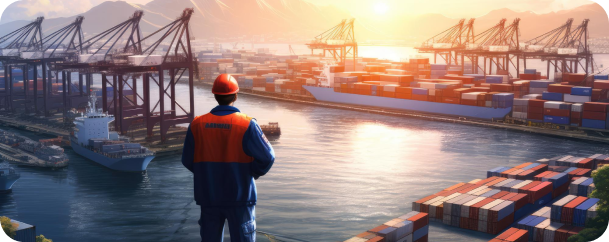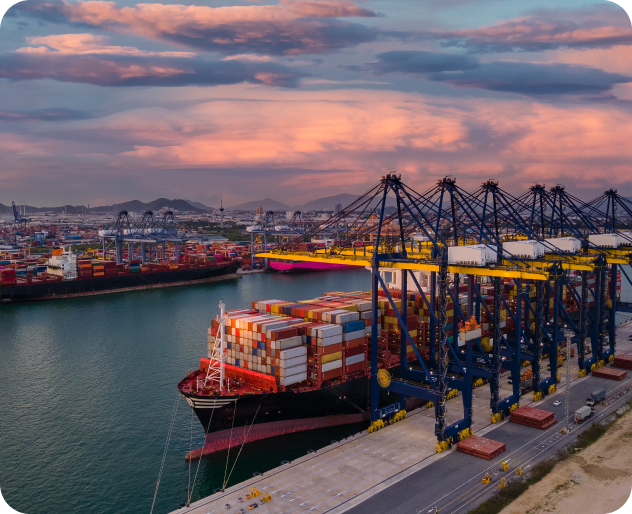Home > Features
Key Features
Explore JamaicaPCS Features
Clients increasingly demand more from logistics service providers. Companies therefore need to innovate so as not to be left behind by competitors using technology to offer their clients with services of strategic value.
JamaicaPCS offers companies a platform that will increase their overall efficieny and improve on the services they offer to their clients by providing them with added-value operational services. The platform is easy to use and comes with the guarantee of offering users the most advanced and secure technology to transmit data electronically.

Paperless Environment
We are going to remove as much paper as possible across the port community’s logistics processes. This will yield significant cost savings in addition to security and efficiency improvements for all involved. First, is the removal of the paper-based Transhipment Shipping Bills (TSB’s), which have always been done in quintuplicate, meaning 5 copies! Shipping Agents can now complete transhipment orders using our web application in a fraction of the time.
We are working with our stakeholders to replace as many paper-based operations as possible. This will reduce tedious paperwork, stationery expenditure and the risk of lost or exposed documents.
Here are some of the documents that will be digitized:
- Manifest, House Manifest and attachments (hard copy)
- Vessel Arrival Notice
- Import/Export Documents (Appendix A and B)
- Crew List
- Pilot Request
- Discrepancies (loading, discharge, stuffing & stripping)
- Transhipment bills and transfer letter
- Delivery Order
- Customs Release
- Gate-Pass (Customs & Terminal)
- Dock Receipt
- Letter of Stuffing/Stripping
- Appointment Request
- Booking Request and Confirmation
Global Accessibility
The system is accessible anytime, anywhere, by a PC with internet connection, putting the user in charge of where and when they access the application. It is also optimized for presentation on any device including mobile phones and tablets, further extending the user’s ability to receive and interact with information.


Global accessibility is a key element of the PCS
01 Globalization
Given that Internet penetration is growing rapidly across the country, the PCS enables shipping companies of different sizes, strengths & locales to have access to the same online tools and capabilities, significantly levelling the playing field and raising the bar overall.
02 Equal Access Opportunities
Given that Internet penetration is growing rapidly across the country, the PCS enables shipping companies of different sizes, strengths & locales to have access to the same online tools and capabilities, significantly levelling the playing field and raising the bar overall.
03 Mobility
Given that Internet penetration is growing rapidly across the country, the PCS enables shipping companies of different sizes, strengths & locales to have access to the same online tools and capabilities, significantly levelling the playing field and raising the bar overall.
04 Fast Business
Given that Internet penetration is growing rapidly across the country, the PCS enables shipping companies of different sizes, strengths & locales to have access to the same online tools and capabilities, significantly levelling the playing field and raising the bar overall.
05 Visibility
Given that Internet penetration is growing rapidly across the country, the PCS enables shipping companies of different sizes, strengths & locales to have access to the same online tools and capabilities, significantly levelling the playing field and raising the bar overall.
06 Visibility
Given that Internet penetration is growing rapidly across the country, the PCS enables shipping companies of different sizes, strengths & locales to have access to the same online tools and capabilities, significantly levelling the playing field and raising the bar overall.
High Availabilty
Jamaica’s shipping industry must consistently and reliably engage in trade and logistics activities in order to enable true trade facilitation and economic development across the country. Its players must be able to operate continuously, 24/7/365, regardless of crime, system failure and natural disaster.
While the country has a blooming import/export industry, it is well established as a regional transhipment hub which is due to its locational and infrastructural advantages. In order to maintain this status in the face of international competition, we must remove any barriers to efficient business. The Port Community System (PCS), by its very design, is meant to break down many of these barriers.
Given that the PCS will now form the central hub for the community, exhaustive steps have been taken to ensure the platform is reliable, consistent and resilient. Regardless of its robust cloud-based infrastructure, multiple layers of redundancy have been built into its architecture, all supported by teams that are dedicated to monitoring and ensuring service continuity

CONNECTIVITY
The platform is securely accessible via the public Internet, regardless of service provider and region. That being said, Jamaica’s telecommunication infrastructure is inherently well-built, with multiple service providers inter-connecting organizations island-wide via fault-tolerant paths built into a vast terrestrial network, all monitored around the clock for performance and uptime. Additionally, the island is linked to many other countries via an extensive and geographically diverse regional network of sub-marine fibers, strengthened with seamless self-healing capabilities.

SYSTEM CONTINUITY
In keeping with modern ICT standards, exigent steps have been taken to implement the PCS’ various components using virtualized infrastructure, embedded deep within the cloud. Using replication, all system components and user data are cloned between multiple independent instances across a region. Failure or degradation of any instance will not affect users who will automatically and seamlessly utilize resources from other remaining instances.

DISASTER RECOVERY
Within each region, multiple backups are maintained for every PCS component and data store, so that failed infrastructure can easily be replaced as soon as possible. Additionally, the PCS infrastructure is replicated in multiple geographically diverse regions that would not be simultaneously affected by any single disaster.
Streamlined Processes
In order to increase the probability of the PCS’ success, representatives of organizations from across the port community have been collaborating to review and redefine the industry’s many business processes. Facilitated by the Port Authority and guided by an industry-led steering committee, the team has made extraordinary efforts to provide the country with first-world logistics processes that will continually be reviewed and improved as time goes by.
- STREAMLINED – Wherever possible, industry processes are being modified to smooth out and remove operational and bureaucratic inefficiencies, allowing businesses to operate effectively, productively and profitably.
STANDARDIZED – To level the industry playing field, all players must apply and operate on the same set of rules, processes and costs. The ensuing consistency will result in the perception of fairness in a standardized environment where all stakeholders can operate on common ground, yielding sustainability across the board.
EVENT-DRIVEN – By exploiting the “just-in-time” productivity concept, the platform will allow stakeholders to efficiently utilize their resources, responding to real-time alerts or notifications rather than wasting valuable resources. Truckers, for example, can await and respond to container pickup notifications without having to wait at the Terminals.
BUSINESS-INTELLIGENCE DRIVEN – Amassing and data mining large amounts of logistics data from the shipping industry will allow players to collectively interpret and exploit commercial trade patterns, for the benefit of improved operations and profits.

Data Security
The PCS utilizes best-in-class intelligent security tactics to collect, store and transmit the industry’s data while protecting it from security breaches of various types and origins. Using multiple layers of protection and having been entrenched deep inside a major security ecosystem, the PCS benefits from the security intelligence being derived from advanced global data analytics strategies.

Interoperability
The major benefit of the PCS is allowing all industry stakeholders to share information electronically thus providing outstanding benefits which include drastic productivity increases, reduced paper-pushing efforts and errors in addition to slashed transportation costs. While the benefits spread across the industry, the expected improvements are greater for some players. Shipping lines, for example, are expected to save 88% of the time traditionally required to complete the transhipment process.
As the central hub of the port community, the PCS is optimally built to integrate with many different types of systems using various methods of connectivity. Given that it is an open and neutral platform, the system has been built to support just about any type of data/file format shared in the shipping industry including XML, EdiFact and Ansi-X12.
